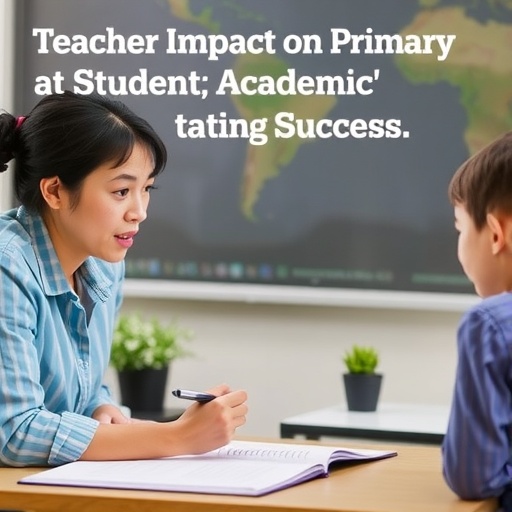In the dynamic and intricate ecosystem of education, the role of social interaction emerges as a central pillar influencing student outcomes. Recent research illuminates how teachers, often regarded as “significant others,” fundamentally shape academic performance through their interactions with students, underscoring the classroom as a critical environment where these social dynamics unfold. This groundbreaking study delves deeply into the nuances of teacher-student relationships and teaching styles, revealing the profound implications these factors have on learning efficacy and educational success.
At the heart of the investigation lies the understanding that teaching is far more than a transfer of knowledge; it is a social process mediated by the teacher’s behaviors and relational practices. Teachers do not merely act as conveyors of curriculum; they embody social references that students interpret to form their self-concept and academic expectations. This process of interpretation profoundly affects students’ motivation and performance, highlighting the classroom as a core setting for crucial interpersonal exchanges that drive educational outcomes.
The research identifies two primary teaching styles—directive and participative—and thoroughly analyzes their effects on the quality of teacher-student relationships and, consequently, academic achievement. The participative style, characterized by encouraging student involvement, fostering dialogue, and expressing empathy, consistently leads to more positive relational dynamics and higher performance outcomes. In contrast, the directive style, which is more authoritarian and task-focused, tends to correlate negatively with academic success when mediated through teacher-student relationships.
These findings resonate with psychological theories emphasizing the role of affect and emotional connection in motivation and learning. The participative approach cultivates a supportive social environment that not only enhances cognitive engagement but also nurtures emotional security, which is critical for effective learning. This alignment with socio-emotional frameworks underlines the multifaceted nature of teaching, where affective relationships are inseparable from instructional quality.
This study employs latent variable modeling to rigorously quantify teaching styles and relational dynamics despite the absence of bespoke assessment instruments specifically targeting teacher roles. This methodological choice is significant because it allows researchers to capture complex, latent constructs and their interplay, offering robust, data-driven insights into the mechanisms underpinning educational success. However, the study does acknowledge limitations posed by the lack of contextual school environment variables such as infrastructure, school policies, and parental involvement, which future research must integrate to develop more comprehensive models.
A critical aspect of the research is its reliance on student perceptions, which provide invaluable insights into the educational experience from the learner’s viewpoint. Though inherently subjective and prone to perceptual biases—such as the tendency of higher-achieving students to rate teachers more favorably—the student perspective remains indispensable. It captures the social-psychological realities of classroom interactions and highlights teacher behaviors students find meaningful, thereby enriching the understanding of instructional effectiveness beyond traditional performance metrics.
The investigators emphasize the importance of triangulating student-reported data with complementary sources, including teacher self-assessments and external evaluations, to mitigate bias and obtain a holistic picture of teaching quality. Recognizing the variability in students’ critical evaluation skills, this triangulated approach enhances the accuracy and applicability of findings, which is crucial for designing informed educational policies and interventions.
Although the dataset primarily represents schools in the Canary Islands, an outermost region of the European Union, the study posits that the foundational social interaction processes observed likely extend across diverse educational contexts. Nevertheless, the authors caution against uncritical generalization, acknowledging variations in educational systems, cultural norms, and institutional frameworks that modulate how teaching styles and relationships impact academic performance worldwide.
The applicability of these findings invites educational stakeholders to reconceptualize teaching practices, advocating for environments that prioritize inclusivity, engagement, and emotional support. By fostering participative teaching styles and nurturing strong, affective teacher-student bonds, schools may create classrooms that serve as incubators for academic excellence and holistic development, transcending cultural and institutional barriers.
Addressing the broader implications for education policy, the research advocates for teacher training programs emphasizing social-emotional competencies, participative pedagogies, and relational skills. Such programs could recalibrate the traditional focus on content delivery toward a more integrative model where student-teacher rapport is integral to learning processes, thereby enhancing educational equity and effectiveness.
The study’s insights also fuel ongoing debates about classroom management paradigms. While directive approaches may offer order and clarity, their negative mediational effects on performance through relational pathways necessitate a reevaluation of their role and application. The preferential endorsement of participative methods encourages educators to balance structure with responsiveness, promoting both discipline and student agency.
Technological advances in education further intersect with this research, as digital learning platforms and hybrid classrooms amplify the importance of social presence and interaction. The principles identified here serve as a guiding framework for leveraging technology without compromising the relational dimensions essential for student engagement and success.
Empirically, the researchers urge the expansion of multilevel analyses incorporating broader ecological variables, such as teacher experience, training, and parental involvement, to capture the multifaceted influences shaping academic achievement comprehensively. Such holistic approaches are vital for unraveling the complex web of factors that educational success depends on.
In summation, this research furnishes compelling evidence of the transformative power teachers wield as social agents in shaping academic trajectories. The mediation pathways unveiled between teaching styles, relational quality, and performance underscore a compelling truth: education is profoundly relational, and success hinges as much on the nature of social interactions as on curricular content.
By advancing an enriched, interaction-focused paradigm of teaching and learning, this study invites educators, policymakers, and researchers to reconceive educational quality through the lens of social dynamics. Future investigations building on these findings can catalyze pedagogical innovations that harness the social essence of classrooms, ultimately fostering inclusive, empowering, and high-achieving educational environments worldwide.
Subject of Research: The influence of teacher roles, teaching styles, and teacher-student relationships on academic performance in primary education.
Article Title: Influence of the teacher role on academic performance in primary education.
Article References:
Díaz Santana, O.D., Cardenal, M.E. & González-Betancor, S.M. Influence of the teacher role on academic performance in primary education. Humanit Soc Sci Commun 12, 1321 (2025). https://doi.org/10.1057/s41599-025-05700-3
Image Credits: AI Generated




